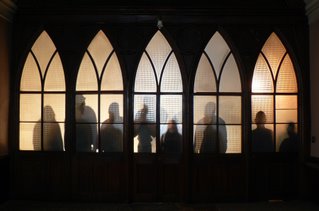A sampling of the more relevant articles in the New York Times includes (login may be required):
- A Room for the Night (Not 40 to Life) (Alison Gregor, 3/18/07) - describes the conversion of the former Charles Street Prison (near Massachusetts General Hospital in Boston's Beacon Hill) into the somewhat humorously named Liberty Hotel. The $110 million reconstruction project includes a new 16-story tower adjacent to the former jail, which began operating in 1851, and the demolition of a daunting wall that separated the institution from the community since around 1940. The hotel will have 298 rooms, of which 20 will be in the old jail building, which had been vacant for 12 years. The project's developer, Carpenter & Company, became interested in the site because of its architectural significance and prime location with views of downtown Boston and the Charles River. The old jail is a "cruciform with four wings, [and] the structure has thick granite walls that enclose a soaring 90-foot atrium at its center — once used as an exercise yard — which is topped by a cupola. Soon, four huge chandeliers, 10 feet in diameter, will hang from winches over entrances leading to two upscale restaurants — one to be called Bread and Water — along with a 3,000-square-foot ballroom off the atrium." The architects are Cambridge Seven Associates and Ann Beha Architects. The project will likely receive $17 million in federal and state historic preservation tax credits and will include interpretive exhibits about the former prison's history. In addition to describing the Boston project, the article also indicates that adaptive reuse of former prison and jails is increasingly popular, referencing jail to bed-and-breakfast and youth hostel conversions; conversion of the Bexar County Jail (constructed in 1878) into San Antonio, Texas' Comfort Inn Alamo Riverwalk, conversion of Sultanahmet Prison in Turkey (contructed in 1918) into the 65-room Four Seasons Istanbul, depicted in the 1978 film "Midnight Express;" and conversion of Her Majesty's Prison Oxford into the Malmaison Oxford Hotel [England].
- A Chinese Village Struggles to Save the Dying Language of a Once Powerful Dynasty (David Lague, 3/18/07) - Noting that the decline of the Manchu language has become a serious obstacle for historians studying the Qing dynasty, this article describes the efforts of a small group of village residents, including 18 that are over 80 years old, to preserve the Manchu language. As the article notes, the residents are "descendants of seminomadic tribesmen who conquered China in the 17th century, they are the last living link to a language that for more than two and a half centuries was the official voice of the Qing dynasty, the final imperial house to rule from Beijing and one of the richest and most powerful empires the world has known. With the passing of these villagers, Manchu will also die, experts say. All that will be left will be millions of documents and files -- about 60 tons of Manchu-language documents are in the provincial archive in Harbin alone -- along with inscriptions on monuments and important buildings in China, unitelligible to all but a handful of specialists." An earlier article, Manchu Language Lives Mostly in Archives (David Lague, 3/17/07) and a video in which an elderly resident speaks and sings in Manchu are also available.
- Another article, In Aisle Three, Couch Potatoes Trying the MP3s (Michael Barbaro, 3/18/07), discusses retailers' growing use of a newish concept called "experience marketing," to sell more products to customers. Experience marketing can and should be a key aspect of downtown/Main Street revitalization programs rooted, of course, in older and historic downtown buildings and neighborhoods. The article notes that the experience marketing concept harkens back to the frequently changing themed displays at department stores in past years, and focuses on recent stores opened by Samsung, AT&T, Verizon, and Maytag (where customers can bake cookies in Maytag convection ovens, put pants through the gentle cycle of a washing machine, or put their best china through a dishwasher). Although Apple [computer] gets only a passing mention, it was perhaps the first company to use the concept in its retail stores and Starbucks and Barnes & Noble have also used the concept for years. For additional information about how Starbucks uses experience marketing, read The Starbucks Aesthetic (Susan Dominus, New York Times, October 22, 2006).
- Chasing the Ultimate Waterfall (Michael Joseph Gross) - the author relates how he began each day in the summer of 2005 by reading the books of explorer David Livingstone and then traced Livingstone's route to Victoria Falls in November of that year to celebrate the 150th anniversary of his discovery of the falls.
- The Barefoot Impresario (Micheline Maynard, 3/18/07)


